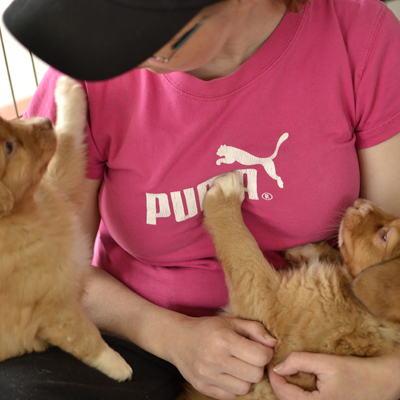So you're looking for a breeder, eh?

Why Not All Breeders Are Created Equal
Choosing the right puppy starts with choosing the right breeder. First things first: not all breeders are created equal. While anyone can breed dogs, not every breeder does so with the same level of commitment, education, and ethics. A responsible breeder is deeply invested in the health, soundness, and future of their dogs—and it shows in every part of their program.
Start with a Relationship
Before anything else, talk with your breeder over the phone. This helps you build a relationship and ensures open communication from the start. If possible, meet your breeder to see the dogs and environment firsthand. If an in-person visit isn’t possible due to distance or scheduling, ask for videos, photos, and details about the setting where the puppies are raised. Many breeders will also be happy to meet you at a local event or show.
Ask About Long-Term Goals
What are your breeder’s goals for their breeding program? Ask them directly. Are they aiming to improve structure, temperament, working ability, or health in their lines? There’s no one “right” answer—but what matters is that you feel comfortable with their motivation. Ethical breeders plan litters to preserve and improve the breed and will often keep one or more puppies themselves to further those goals.
Evaluate Their Puppy Socialization and Training Program
Socialization and early training are crucial. Puppies between 6–8 weeks should be curious, friendly, and adaptable. Reputable breeders will expose puppies to a variety of people, sights, sounds, surfaces, and age-appropriate training challenges to build a well-rounded temperament. Ask your breeder what their daily routine is like for the puppies, and how they prepare them for life in a new home.
Talk About Temperament and Pedigree Expectations
Your breeder should be able to provide a general idea of the expected temperament of a litter—even before the puppies are born—based on the pedigree and previous litters from similar pairings. Once the puppies are on the ground, temperament starts to show as early as 4 weeks and continues to develop through 8 weeks. Ask your breeder what traits they are observing and how those align with what you’re looking for in a companion.
When Can Puppies Go Home?
Puppies should never go home before 8 weeks of age. In fact, in some areas, this is a legal requirement. The ideal time for most puppies to transition to a new home is between 9–12 weeks. This allows them to learn valuable lessons from their littermates and dam—such as bite inhibition, social boundaries, and confidence-building skills.
Health Concerns and Transparency
Ask your breeder what health issues they’ve encountered in their program. If they tell you their dogs are “clean” or have “no problems,” that’s a red flag. Every breed, including Nova Scotia Duck Tolling Retrievers, has known genetic concerns—and no pedigree is immune. A knowledgeable breeder will be transparent about what they’ve seen, what they test for, and how they manage risks.
For detailed information on health conditions in Tollers, we recommend reviewing the Toller Health Resource (http://www.toller.ca/tollerhealth/Conditions.html).
Contracts and Health Guarantees
Request a copy of the breeder’s contract before making any commitments. A good contract protects both the buyer and the seller, and most reputable breeders offer health guarantees covering genetic disorders up to at least 24–30 months of age. Contracts often include clauses on spay/neuter timing, return policies, and requirements for care and training.
Breeder Support and Puppy Returns
A responsible breeder will always want to ensure their puppies are in good homes—and will absolutely take a puppy back if you are unable to keep it. Rehoming support is one of the clearest signs of a breeder who truly cares about their dogs for life—not just until the sale is made.
Observe the Dogs and Environment
When meeting your breeder, observe the dogs: are they happy, healthy, and social? Does the environment feel clean, safe, and stimulating? Are the breeder’s dogs clearly well cared for? Just as importantly—do you feel comfortable working with this person for the life of your dog? You should expect your breeder to ask you a lot of questions and possibly have you complete a questionnaire. That’s a sign they’re being thoughtful about where their puppies go.
Memberships and Clubs: What Matters?
Ask if your breeder is a member of the Canadian Kennel Club (CKC). The CKC is the official registry for purebred dogs in Canada and lists breeders in good standing:
Find CKC Breeders (http://www.ckc.ca/en/Default.aspx?tabid=493)
The Nova Scotia Duck Tolling Retriever Club of Canada (NSDTRC) and the NSDTRC-USA also provide breeder directories and educational resources. However, being part of a breed club doesn’t automatically make someone reputable, just as not being listed doesn’t mean they’re irresponsible. Club membership may be political, and not all breeders choose to join. So, don’t make assumptions—do your research and ask good questions.
In Summary
No matter what your goals are—whether you’re seeking a family companion, a performance dog, or a future show prospect—your breeder plays a critical role in your puppy’s future. Take your time, ask thorough questions, and build a relationship based on mutual trust and transparency. A good breeder doesn’t just sell you a dog—they become part of your extended support network for the life of your dog.
Good luck—and enjoy the journey!
